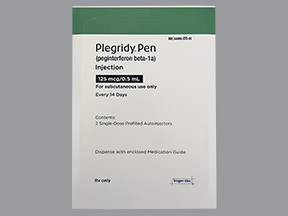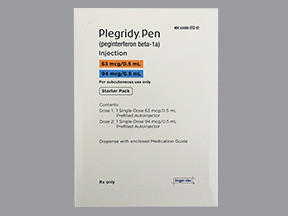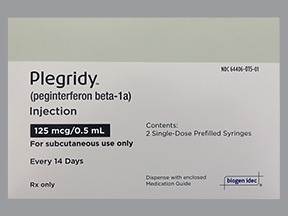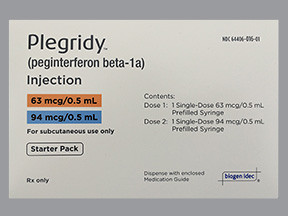PEGINTERFERON BETA 1A - SUBCUTANEOUS INJECTION
PHONETIC PRONUNCIATION: (peg-IN-ter-FEER-on BAY-ta wun ay)
COMMON BRAND NAME(S): Plegridy
GENERIC NAME(S): peginterferon beta-1a
Uses
USES: This medication is used to treat multiple sclerosis (MS). Peginterferon is not a cure for MS, but it may help to decrease the number of episodes of disease worsening (relapses) and slow the worsening of the disease.
How to use PEGINTERFERON BETA 1A - SUBCUTANEOUS INJECTION
HOW TO USE: Read the Medication Guide and, if available, the Instructions for Use Leaflet provided by your pharmacist before you start using peginterferon and each time you get a refill. If you have any questions, ask your doctor or pharmacist. If you are using this medication at home, learn all preparation and usage instructions from your health care professional. Before using, check this product visually for particles or discoloration. If either is present, do not use the liquid. Learn how to store and discard medical supplies safely. If this medication is stored in the refrigerator, remove the medication from the refrigerator and let it warm at room temperature for about 30 minutes before injecting. Do not use heat sources (such as warm water) to warm this medication. Before injecting each dose, clean the injection site with rubbing alcohol. Change the injection site each time to lessen injury under the skin. Do not inject into skin that is irritated, bruised, scarred, or infected. Inject this medication under the skin in the thigh, abdomen, or the back of the upper arm as directed by your doctor, usually every 14 days. Check the injection site 2 hours after injecting to see if there is any reaction at the injection site. Tell the doctor of any skin reactions that do not go away after a few days. To reduce your risk of side effects, your doctor may direct you to start this medication at a low dose and gradually increase your dose. A starter pack with different doses of this medication may be used when starting this medication. Follow your doctor's instructions carefully. Use this medication regularly to get the most benefit from it. To help you remember, use it at the same time and same day of the week. You may need to take other medications to reduce common side effects such as fever and pain (such as acetaminophen, ibuprofen). Consult your doctor or pharmacist about how to use these medications safely with peginterferon. Tell your doctor if your condition worsens.
Side Effects
Precautions
Interactions
Overdose
Images
Reviews
Faq for PEGINTERFERON BETA 1A - SUBCUTANEOUS INJECTION
Peginterferon beta 1a is a medication used to treat multiple sclerosis (MS), a chronic disease that affects the central nervous system. It helps to reduce the frequency of MS relapses and slows down the progression of the disease.
Peginterferon beta 1a is administered through subcutaneous (under the skin) injections. It is usually given once every 2 weeks.
Common side effects of Peginterferon beta 1a include injection site reactions (redness, pain, swelling), flu-like symptoms (fever, chills, muscle aches), fatigue, headache, and gastrointestinal symptoms (nausea, diarrhea, vomiting).
The effects of Peginterferon beta 1a may vary from person to person. Some individuals may start experiencing improvements in MS symptoms within a few weeks, while others may take several months to notice a difference. It is important to continue the treatment as prescribed by the doctor, even if there are no immediate noticeable effects.
Yes, Peginterferon beta 1a injections can be self-administered at home, following proper instructions provided by your healthcare provider. It is important to learn the correct technique for injection and to dispose of the used needles properly.
Peginterferon beta 1a should be used with caution in individuals with a history of depression or suicidal thoughts. It may also affect liver function, so regular monitoring of liver enzymes is required. It is important to inform your healthcare provider about any existing medical conditions or medications you are taking before starting treatment with Peginterferon beta 1a.
You should inform your healthcare provider about all the medications you are currently taking, including prescription drugs, over-the-counter medications, and herbal supplements. Some medications may interact with Peginterferon beta 1a, so your doctor can determine if any adjustments or precautions are necessary.
The duration of treatment with Peginterferon beta 1a may vary depending on the individual's response and the severity of their MS. Your healthcare provider will determine the appropriate duration of treatment for you.
If you forget to take a scheduled dose of Peginterferon beta 1a, you should take the missed dose as soon as you remember, unless it is close to the time for your next scheduled dose. In that case, skip the missed dose and resume your regular dosing schedule.
Disclaimer
IMPORTANT: HOW TO USE THIS INFORMATION: This is a summary and does NOT have all possible information about this product. This information does not assure that this product is safe, effective, or appropriate for you. This information is not individual medical advice and does not substitute for the advice of your health care professional. Always ask your health care professional for complete information about this product and your specific health needs.





No Reviews Yet